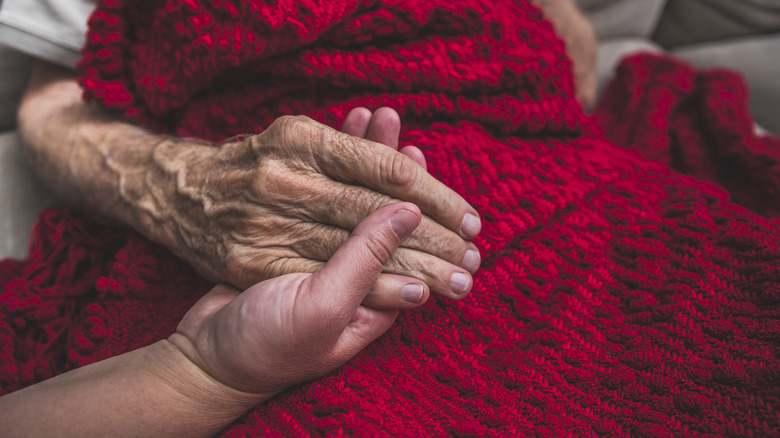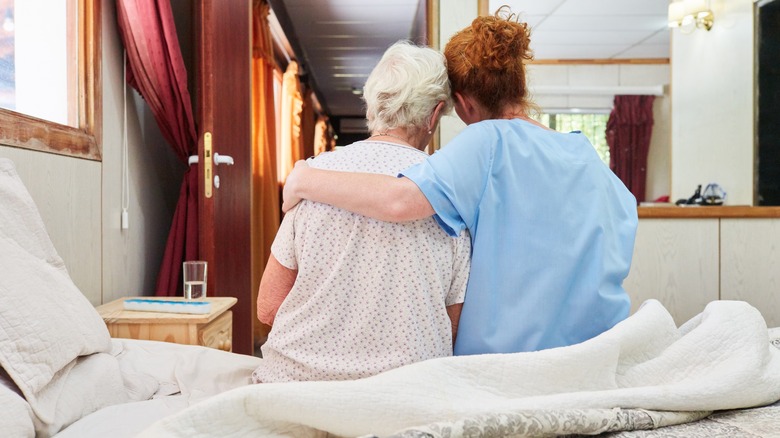Can We Choose When We Die? What We Know
We may receive a commission on purchases made from links.
Movies, books, and even personal accounts record how, sometimes, people who are in the last stages of life hold on until something they dearly wished for gets resolved. It could look like reconciling with a loved one, spending time with someone they haven't seen in years, or getting the blessing of a priest.
Given that there's a lot we don't know about what people see and hear before they die, is there any truth to the fact that we can choose when we die? Can we willfully resist death until we're ready to let go? Science tells us that dying is a process: The person's breathing slows down; their skin color and temperature change; they might experience difficulty breathing; they could sleep a lot more than usual; and their thinking and other senses may dwindle, per Health Direct. However, according to several hospice and palliative care workers, there is some truth to the thinking that people can hold on till they're ready to let go.
Dr. Toby Campbell, a thoracic medical oncologist in the Division of Hematology, Medical Oncology and Palliative Care at the University of Wisconsin School of Medicine and Public Health, told STAT News, "People in end-of-life care wouldn't bat an eye if you asked if they think people can, to a certain degree, control those final moments. We'd all say, 'Well, yeah. Sure.' But it's inexplicable." Science might not have studied this phenomenon extensively nor arrived at one possible explanation, but there are some theories.
It could be related to a hormonal stimulus
What allows someone in the last stages of dying to prolong their life until some unfinished business is completed? Dr. Campbell thinks it could have something to do with a hormonal stimulus (via STAT News). People in the final stages of death "probably have some kind of hormonal stimulus that's just a driver to keep them going. Then, when whatever event they were waiting for happens, the stimulus goes away, and there must be some kind of relaxing into it that then allows them to die."
Charles F. von Gunten, a pioneer in the field of hospice and palliative medicine, agreed. "What people will do for one another in the name of love is extraordinary. I think of it as a gift when it happens," he told The Washington Post.
However, there might be something else that happens that gives dying people a chance to enjoy what time they have left with loved ones before they die. Healthcare professionals call this "rallying" or "the surge," as explained by licensed hospice nurse, Julie McFadden, who goes by the name Hospice Nurse Julie on YouTube. "A patient will look like they are actively dying or getting very close to death ... And then suddenly, they perk up and they start acting like their old selves again. They may be hungry, eat, talk, laugh, joke around, be a little sassy with their family ... They frequently do this and then pass away usually the next day." Again, this isn't understood well by healthcare workers but it does give loved ones a chance to say goodbye.
How to let go when death is near
Regardless of whether your loved one is holding on so they can spend more time with you or they are experiencing a surge in life just before dying, death is often something we aren't prepared for. Some people may even experience what is known as "anticipatory grief" — feelings of loss even before their loved one has actually died.
What dying people want you to know, on the other hand, might change depending on their particular life situation; but there is a big possibility that there might be regrets, most of which might have to do with relationships.
The author of the book "Dying Well: Peace and Possibilities at the End of Life," Dr. Ira Byock, seems to think that we can choose how we die. Byock, who's a physician and advocate for palliative care, shared in his book that people who are about to die should take the time to say goodbye (via Help Guide). Sentiments like "I love you," "I forgive you," "Forgive me," and "Thank you" are not overrated and should be prioritized between loved ones and the person who's dying. For loved ones who are letting go, it might also be important to let your dying family member know that it's alright for them to go and that you will be okay. It could offer immense relief to them when they need it most.



